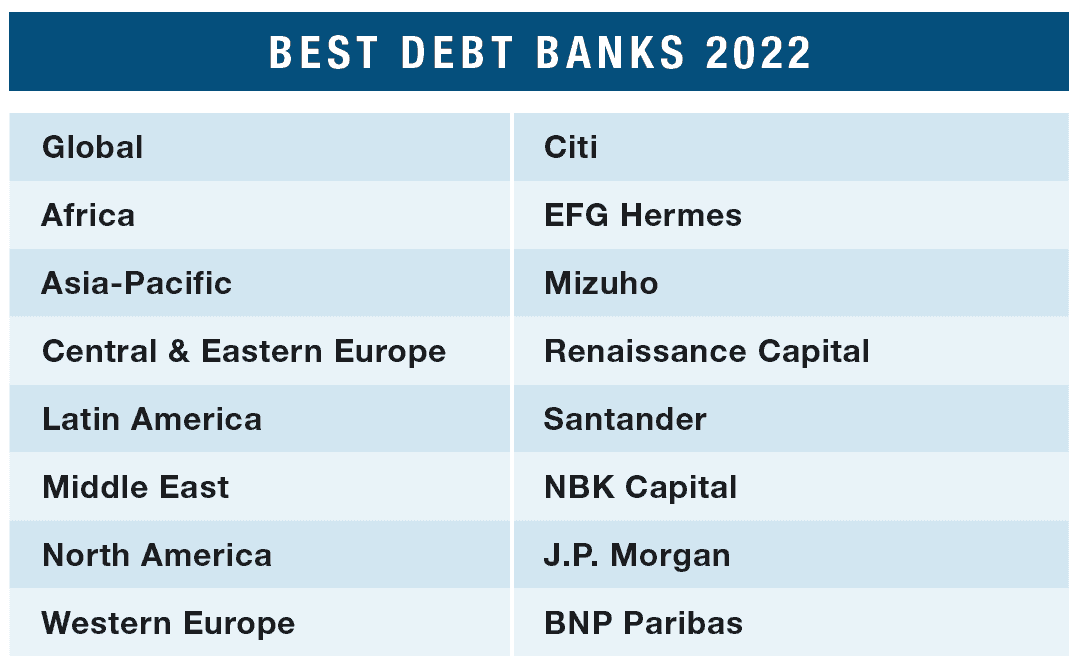Bond markets generally slid, but green issuances continued to roll.

The macro environment wasn’t particularly beneficial for bonds in 2021. Excess liquidity and higher inflation pushed investors worldwide away from safe-haven, low-yield investments.
As a result, total global debt activity fell by 3% compared to a year earlier, to $10.2 trillion, according to Refinitiv.
With many companies having already loaded up on debt during the cheap-money era, investment-grade corporate debt saw the biggest decline, falling 6% year on year. The unfavorable change was mainly propelled by the US market, which posted a 22% decline in value for the period in the instrument.
The big growth story now is the sustainable-finance movement. Green bonds rose a whopping 98%, totaling $485 billion for the year, a record. High-yield debt also hit a record, rising 17% to $649 billion.
Looking through a regional lens, Asia (excluding Japan) was the clear winner for the year, posting 5% growth. Furthermore, emerging market bonds outpaced issuances in developed economies, growing 2% over the prior year. —TM
GLOBAL
Citi
Citi’s solid and diversified global framework allowed it to excel in the challenging environment of 2021 debt markets, making it our global Best Debt Bank. The bank’s exceptional leadership in sustainable bonds also deserves recognition.
In the US, Citi was able to counter broader market conditions and post $336,590 million in proceeds for the year, a record for the bank. The figure was mainly propelled by Citi’s management of two of the largest bond offerings of the year: AerCap Holdings’ $21 billion issuance and Amazon’s $18.5 billion acquisition of Nuance. The bank also excelled in Latin America and Asia, taking advantage of favorable emerging market conditions in the capital debt markets there.
Furthermore, Citi’s nearly 1% yearly growth in the global green bond market is the largest among American behemoths. It marks a pivotal point for the bank’s sustainability strategy, as noted by Jorge Rubio Nava, head of Citi Social Finance: “Our transition to social finance builds on our leadership in financial inclusion and expands the scope of our impact to other areas, reflecting an intentional business strategy to integrate social impact into Citi’s transactions.” —TM
AFRICA
EFG Hermes
With a franchise that covers Nigeria, Kenya and the Middle East, Egypt-based EFG Hermes applies its comprehensive knowledge of debt capital markets in Africa to connect investors and companies to unique pockets of liquidity. The firm is our winner for Best Debt Bank in Africa based on its execution capabilities, with 11 transactions for $363 million, and pioneering role in introducing the first sukuk transaction, first short-term note and first securitized bond in the Egyptian market.
It employs targeted securitization services. Examples include $24 million for Egyptian credit card company Premium Card, and consumer-finance firm valU’s first $20 million securitization issuance. In the oil and gas sector, EFG Hermes arranged a $43 million debt facility for ADES International. Demonstrated success in the real estate sector includes acting as sole arranger and financial adviser on a $45 million securitization issuance for Amer Group and Qasatli, securing a total $149 million in securitization issuance from three consecutive deals for Talaat Mostafa Group, and executing a $22 million securitized bond offering for Sodic. —DS
ASIA-PACIFIC
Mizuho
When 2021’s macro environment presented singular challenges for capital debt markets, Mizuho was perfectly positioned to expand its global operations while keeping its domestic leadership status intact. In 2021, Mizuho was the leading debt issuer in Japan, with a 22.7% market share by value of total bonds in yen. The bank also excelled in the number of domestic issuances, with a 35% advantage over its closest competitor, Nomura Bank.
Mizuho’s ability to find opportunities in other markets was even more remarkable. It took advantage of a slow year in US debt issuances to consolidate its leadership among Asian banks in the world’s largest capital market, for example, with a 0.2% gain in total market share, and expanded debt operations in the Middle East. The bank was involved in Latin America’s largest sustainability-linked bond, $750 million for Brazil-based pulp and paper company Suzano. Mizuho also displayed solid growth in one of the year’s most remarkable trends, high-yield corporate debt (so-called junk bonds), attaining a 2.2% market share. —TM
CENTRAL & EASTERN EUROPE
Renaissance Capital
The fate of Moscow-based Renaissance Capital is uncertain. Although not sanctioned as of press time, the bank is surely seeing some consequences from Russia’s invasion of Ukraine. Our choice for Best Debt Bank in Central and Eastern Europe, made well before the hostilities, is based on its prior performance. Among the raft of deals in the last year, Renaissance notably acted as joint lead manager on a $500 million green eurobond issue for Georgian Railway. The issue saw an oversubscription of more than nine times—the largest ever achieved by a Georgian issuer. The new issue also saw strong follow-on demand in the secondary market. Renaissance was also joint lead manager and joint bookrunner on a landmark deal for Russia’s privately owned Sovcombank, which saw the first ever social bond in CIS (Commonwealth of Independent States) and the lowest ever coupon for a non-IG issuer out of Central and Eastern Europe, the Middle East or Africa. —DR
LATIN AMERICA
Santander
Latin America’s bond markets picked up steam in the latter part of the year as the region’s central banks started to aggressively raise rates. Santander took great advantage of that trend, growing its market share in Latin American emerging-market bonds by 2.7%, to reach an 8.3% share of the total market.
Santander’s expansion displays the growing importance of ESG in the region’s debt capital: The bank managed a substantial share of sovereign sustainable debt issued by Chile. Moreover, the Spanish-based bank also focused on ESG-related bonds in its operations in Mexico, closing in on the country’s leading lender, BBVA, with a 1.2% jump in total issuances. In Brazil, Santander managed the $1 billion sustainability-linked emissions bond by JBS in mid-November and the $350 million bond issuance by ethanol producer Coruripe in February. —TM
MIDDLE EAST
NBK Capital
NBK Capital takes the Middle East nod for Best Debt Bank by providing specialized investment banking services in the debt capital markets, embracing global best practices and leveraging its local and regional knowledge to deliver strategic and innovative solutions in originating and executing on a range of debt offerings including conventional, Islamic and structured securities for its institutional clients. Since its formation in 2005, the firm has executed on $33 billion in debt capital market mandates and restructuring assignments.
NBK Capital advised on 70% of all volume raised by Kuwaiti issuers in both the local and international debt markets and advised on all global medium-term note programs by Kuwaiti issuers. Key mandates in 2021 included Saudi Aramco’s $6 billion sukuk issuance, the largest international sukuk transaction to date. NBK also acted as global coordinator for Equate Petrochemical’s $700 million global medium-term note issuance. —DS
NORTH AMERICA
J.P. Morgan
JPMorgan Chase dominates the North American and global investment banking league tables in debt capital markets, but it is the firm’s leadership in sustainable finance and its innovation in development finance that makes it our 2022 choice for Best Debt Bank in North America.
While US debt issuance declined 10% in 2021, the firm maintained its top position in US debt proceeds, with a 12% market share. It also ranks first in high yield, investment grade, mortgage-backed and asset-backed securities categories, according to Refinitiv. In sustainable finance, JPMorgan ranks first in ESG bonds and green bond proceeds and is undertaking an aggressive strategy to further serve this market. Most notably, the firm is targeting $2.5 trillion over the next 10 years to advance ESG initiatives—the most ambitious publicly announced target among its peers. Additionally, the firm operates the JPMorgan Center for Carbon Transition, which helps clients navigate to a low-carbon future. The firm is building on the 2020 launch of the J.P. Morgan Development Finance Institution to direct capital toward financing the UN Sustainable Development Goals. —DS
WESTERN EUROPE
BNP Paribas
Debt capital markets saw a global decline except in Europe, where activity ticked up just 1% over the prior year, according to Dealogic. BNP Paribas was Europe’s top bookrunner in debt capital markets, with proceeds of $175.13 billion over 642 deals, ahead of all the global banking goliaths. The French international banking group also came out on top of the Refinitiv rankings, with several highlights in its home country, including the largest European high-yield bond issue of the year: a €3.7 billion (about $4.1 billion) four-tranche dollar and euro-denominated bond issue in support of the public-to-private acquisition of one of the biggest telecommunications companies in Europe, Iliad Group. Notably, the bank was also joint active bookrunner for the Republic of Italy’s €8.5 billion inaugural green bond (issued in the runup to COP26). —DR




